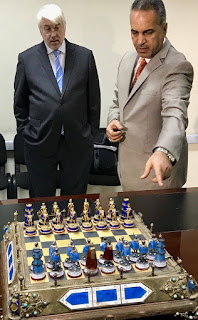Tuesday, September 05, 2017 -  Antiquities; Looting; Smuggling; Collecting; Collections; iraq,art crime in war
Antiquities; Looting; Smuggling; Collecting; Collections; iraq,art crime in war
 No comments
No comments
 Antiquities; Looting; Smuggling; Collecting; Collections; iraq,art crime in war
Antiquities; Looting; Smuggling; Collecting; Collections; iraq,art crime in war
 No comments
No comments
Iraqi pawns and an American chess player
 |
| Image Credit: U.S. Embassy Baghdad |
The United States has returned dictator Saddam Hussein’s chess set to the Iraqi government in Baghdad but has not given much in the way of details as to who the set had been stolen by or where it has been recovered.
 |
| Image Credit: U.S. Embassy Baghdad |
The gameboard and its pieces went missing in 2003. U.S. coalition forces invaded Iraq in an operation dubbed Operation Iraqi Freedom between March 20th and May 2003 signalling the start of the Iraq War. Hussein’s Ba'athist Iraqi government was deposed less than a month later. Hussein himself was captured in December 13, 2003 and was executed in December 2006, having been convicted of crimes against humanity by the Iraqi Special Tribunal.
 |
| Image Credit: U.S. Embassy Baghdad |
Whoever made off with this little piece of costly war booty had a good eye, even if it appears that the object was not treated gently as it made its passage from the Middle East to the United States.
A similar Austro-Hungarian enamelled, parcel-gilt silver and stone-inset chess set was sold at Sotheby’s in its New York April 22, 2010 auction for $35,000.
John Moran auctioneers sold one too for $20,700 on April 27,2010.
Another set sold at Doyle's, New York, Belle Epoque sale on September 23, 2009, lot 209 ($28,125). Provenance: Property from a Private Collection, Fontana, CA. Condition.
Five years ago a Christie’s consignor (property of a private collector in Pittsburg) made a healthy profit during its New York April 18, 2012 auction selling theirs for $32,500.
Even an online seller was ably to flog his own $10,000 version on the power auction site eBay from the estate of Harry Cohn, the Founder Columbia Pictures in 2014.
All proving that years after the invasion, auction houses in the U.S. wouldn't have had any trouble selling this Saddam-era bauble, which, like many others, may be traceable back to U.S. government employees and contractors who took items as souvenirs or war trophies.


0 comments:
Post a Comment